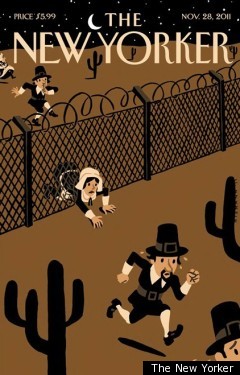The cover of the current New Yorker magazine, depicting Pilgrims in buckled hats and buckled jackets crawling through a hole in a border fence, is a fine example of the sensibility among many affluent, liberal Americans about illegal immigration. (My colleague David North has mentioned the cover as well.) I think of it as a quintessentially Upper West Side of Manhattan sensibility. It is most commonly seen on the New York Times editorial page. It scorns those who want firm action against illegal immigration as small of mind and angry of spirit.
Here is what artist Christoph Niemann, an immigrant from Germany, told the Latino Voices section of Huffington Post, by way of explaining the theme of his illustration. "The debate should be about how can a country benefit from immigration. America depends on immigration. The discussion will be more valuable if it is focused on benefits."
Not far away from the Upper West side, this cheerful open-the-border-and-deregulate-immigration spirit has a corollary on Wall Street. There many bankers continue to insist that we should focus on the benefits of deregulated financial markets.
The two ideologies share a determination to close their eyes to what economists call the "externalities" of their positions – the costs that they impose on the rest of society. That determination helps explain why Wall Street remains largely unregulated and why illegal immigrants continue to pour under, over, and around the border fence into job markets unregulated by a credible requirement that workers be authorized to be in the country.
I have a friend in Arizona who is an immigrant from Austria. He is a staunch liberal. He sent me this comment on the New Yorker cover: "That's the way I saw it as long as I was far removed from the reality of the situation."
I believe that the best way out of our stalemate on immigration policy would combine a broad amnesty for illegal immigrants with a credible commitment to stop future illegal immigration. The Niemann/New Yorker/New York Times philosophy undermines the effort to build a compromise. It is a major reason for the failure of the compromise brought to us by Congress in 1986, the fraudulently titled Immigration Reform and Control Act.
